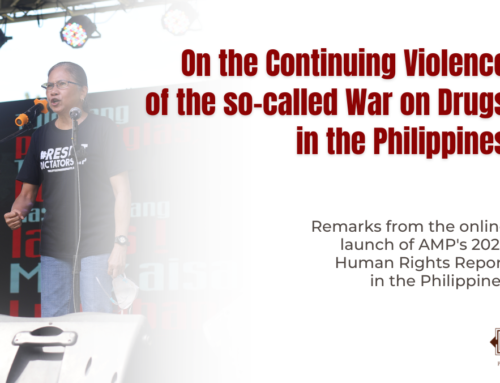By PhilRights Staff
Welcome to HR Insights, a weekly roundup of human rights news in the Philippines. This week…
PH keeps preferential EU trade status, but “serious concerns” on human rights remain
After speculation that the European Union (EU) will not renew the Philippines’ preferential status in the bloc’s Generalized Scheme of Preferences Plus (GSP+) program because of the country’s dismal human rights record, the EU has ultimately decided to retain the lucrative arrangement.
As the Manila Bulletin reports, GSP+ is a preferential trade scheme that grants developing countries like the Philippines with “duty-free access to over 6200 tariff lines, which now account for 26 percent of the country’s total exports to the EU market.”
Retaining a GSP+ status requires that recipient countries “implement core international conventions on human and labour rights, sustainable development and good governance.” Determining a country’s scorecard involves a review process which will be summed up in an official report. That report, released last week, notes that the Philippines made progress on areas of labor rights, environment protection, climate change, and gender equality, according to the Bulletin story.
However, the same report also said the EU remains concerned about the country’s rights record. Rappler quoted the report as saying “Extrajudicial killings and the impunity for those responsible, as well as the possible reintroduction of the death penalty and the lowering of the age of criminal responsibility are issues of serious concern for the EU.”
ICJ, UN special rapporteurs express support for Rappler
Adding to the chorus of criticism following the Securities and Exchange Commission’s suspension of Rappler’s license to operate, the International Commission of Jurists’ (ICJ) and three United Nations special rapporteurs released statements condemning the government’s move.
ICJ’s statement points out that targeting Rappler “may have been retaliatory and politically motivated.”
Rappler itself reported on the statement, quoting ICJ’s contention that “If such restrictions on freedom of expression are enforced with the actual aim of punishing or preventing critical political expression, or are enforced only against some political or other opinions and not others, this would violate the rights to freedom of expression and non-discrimination under the Philippine Constitution and international human rights law.”
The International Commission of Jurists is one of the most eminent legal organizations in the world, having been founded in 1952, and is currently composed of 60 judges and lawyers worldwide. Learn more about their work here.
Reuters, meanwhile, quotes the joint statement of David Kaye, special rapporteur on the right to freedom of opinion and expression, Michael Forst, special rapporteur on human rights defenders, and Agnes Callamard, special rapporteur on extrajudicial, summary or arbitrary executions. The three UN experts emphasized the need for independent outlets such as Rappler for “particular protection because of the essential role they play in ensuring robust public debate.” They added that the timing is especially concerning, since the decision “comes at a time of rising rhetoric against independent voices in the country.”
CHR expresses grave alarm over proposed freedom of speech limits
Concerns were immediately raised when a House of Representatives sub-committee tasked to review and come up with amendments to the Bill of Rights proposed earlier this month to add “responsible exercise of” to Article III Section 4, which prohibited any law that would abridge freedom of speech, of expression, and of the press.
Now the Commission on Human Rights is also weighing in. In a January 24 statement quoted by Rappler, the human rights body criticized the proposal as being “vague in its definition of what ‘responsible exercise’ means” allowing for “subjective interpretation of the phrase.” That subjective interpretation, of course, can lead to serious curtailment of these sacrosanct freedoms guaranteed by the Constitution.
CHR also pointed out that such an amendment will violate the International Covenant on Civil and Political Rights, which the Philippines has ratified and is therefore beholden to follow.
Read the entire International Covenant on Civil and Political Rights here (
TESDA to offer skills training to Martial Law Rights Claimants
Technical Education and Skills Development Authority (TESDA) director-general Guiling “Gene” A Mamondiong has said that the agency will be offering free training interventions for the 6,000 eligible claimants of reparations identified by the Human Rights Victims Claimants Board (HRVCB), according to a Manila Bulletin report.
Beneficiaries or their qualified dependents can enjoy services such as training needs assessment, career counseling, competency assessment and certification, entrepreneurship training and job referrals, aside from regular skills training programs. Various scholarship programs are also available.
These services are part of the nonmonetary reparation (NMR) benefits offered to those who have been identified as being victims of human rights violations during Martial Law, covering the period from Sept. 21, 1972 to Feb. 25, 1986.
Besides TESDA, the Commission on Human Rights, Department of Social Welfare and Development, Department of Health, Department of Education, Commission on Higher Education, Department of Interior and Local Government and PhilHealth have all been tapped to identify obligations for nonmonetary reparations for the claimants.
Must Read: A journalist tracks the Catholic Church’s fight against the “war on drugs”
How exactly is the Catholic Church returning to the frontlines to oppose the Duterte administration’s so-called “war on drugs,” asks Berlin-based freelance journalist Sean Williams.
In a longform piece for America: The Jesuit Review of Faith & Culture, Williams finds a “wider movement against the drug war’s rising body count” among the Catholic clergy. He profiles the actions of Caloocan Bishop Pablo Virgilio David as a key turning point, calling Bishop David’s protection for witnesses of Kian Loyd delos Santos’ murder a “significant act of resistance.”
Throughout, he provides context for the Catholic Church’s sometimes uneasy involvement in Philippine political and social movements throughout history. While noting that the Church leadership has not been vigorous in publicly condemning the campaign against illegal drugs, Williams finds promising signs of resistance in grassroots and parish-based actions.





